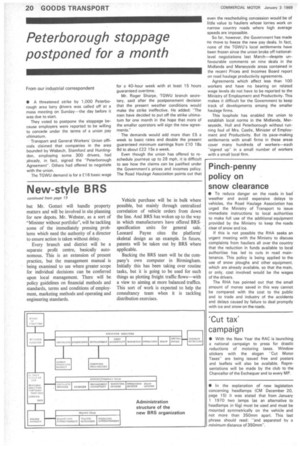Peterborough stoppage postponed for a month
Page 22

If you've noticed an error in this article please click here to report it so we can fix it.
From our industrial correspondent • A threatened strike by 1,000 Peterborough area lorry drivers was called off at a mass meeting on Sunday—the day before it was due to start.
They voted to postpone the stoppage because employers were reported to be willing to concede under the terms of a union pay ultimatum.
Transport and General Workers Union officials claimed that companies in the area bounded by Wisbech, Stamford and Huntingdon, employing some 300 drivers, had already, in fact, signed the "Peterborough Agreement-. Others had offered to negotiate with the union.
. The TGWU demand is for a £16 basic wage for a 40-hour week with at least 15 hours guaranteed overtime.
Mr. Roger Sharpe, TGWU branch secretary, said after the postponement decision that the present weather conditions would make the strike ineffective. He added: "The men have decided to put off the strike ultimatum for one month in the hope that more of the smaller operators will sign the new agreements."
The demands would add more than E5 a week to basic rates and double the present guaranteed minimum earnings from £10 18s 6d to about £22 15s a week.
Even though the union has offered to re-schedule journeys up to 28 mph, it is difficult to see how the claims can be justified under the Government's prices and incomes policy. The Road Haulage Association points out that even the rescheduling concession would be of little value to hauliers whose lorries work on narrow country roads where high average speeds are impossible.
So far, however, the Government has made no move to freeze the new pay deals. In fact, none of the TGWU's local settlements have been frozen since the union broke off nationallevel negotiations last March—despite unfavourable comments on nine deals in the Midlands and Merseyside areas contained in the recent Prices and Incomes Board report on road haulage productivity agreements.
Agreements which affect less than 100 workers and have no bearing on related wage levels do not have to be reported to the Ministry of Employment and Productivity. This makes it difficult for the Government to keep track of developments among the smaller haulage firms.
This loophole has enabled the union to establish local norms in the Midlands, Merseyside, Hull and Peterborough without running foul of Mrs. Castle, Minister of Employment and Productivity. But its pace-making settlements with small firms in these areas cover many hundreds of workers—each "signed up" in a small number of workers with a small local firm.




























































































